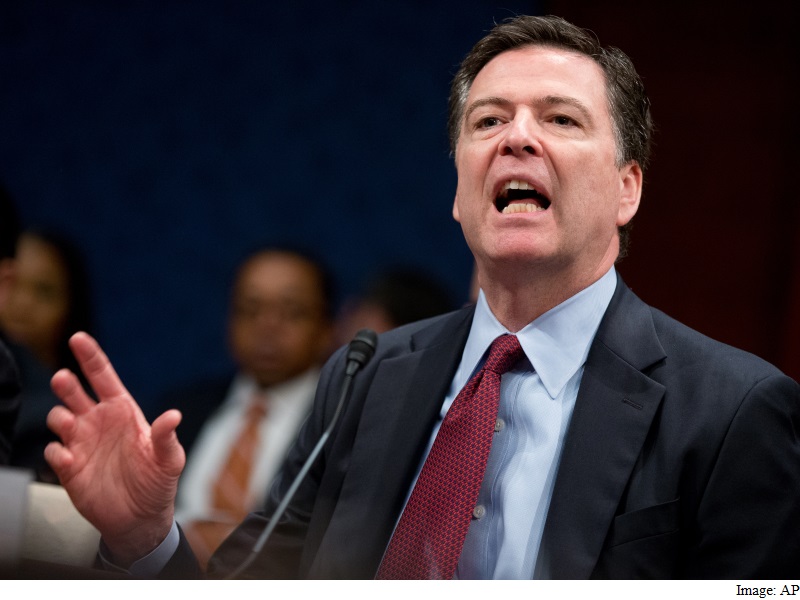- Home
- Mobiles
- Mobiles News
- FBI Chief Acknowledges Apple Case May Set Privacy Precedent
FBI Chief Acknowledges Apple Case May Set Privacy Precedent

Federal prosecutors simply want any potential evidence that may be on a phone used by one of the attackers in the December mass shooting in San Bernardino, California, Comey said. Even so, the director agreed with Apple's claim that the outcome may have broader consequences.
(Also see: Apple Challenges FBI's iPhone Demand as 'Oppressive')
"Whatever the judge's decision is in California, it will be appealed and it will be instructive for other courts," Comey testified before the House Intelligence Committee. "There may well be other cases that involve the same kind of phone and same kind of operating system."
The dispute between Apple and the Justice Department is part of a larger debate within Congress, the administration and the technology industry about whether law enforcement and intelligence agencies should be able to access encrypted communications.
The FBI served Apple with a court order on Feb. 16 requiring the company to write a new software program to unlock the phone used by Syed Rizwan Farook in the shooting spree in December. Farook, along with his wife, shot to death 14 workers before the couple was killed by police. The FBI wants to know where they had been and who helped them.
Apple is refusing to cooperate. Apple's chief executive Tim Cook has vowed to fight the order, saying the software doesn't exist and creating it would potentially put billions of iPhones at risk of being hacked or spied on by governments. Apple's response to the court is due Friday.
In an interview aired Wednesday on ABC's "World News," Cook said that while public safety is important, complying with the court order would set a precedent that would offend many Americans. He disputed the government's contention that the impact of the demand is limited.
"The only way to get information, at least currently the only way we know, is to write a piece of software that we view as sort of the software equivalent of cancer," Cook said.
During his testimony, Comey told lawmakers the company has been helpful and cooperative, even in the current dispute.
"There are no demons in this dispute," he said. "We just got to a place where they were not willing to offer the relief that the government was seeking."
Comey added that the encryption issue was the "hardest question I have seen in government" and that he would like to see it resolved through conversation and negotiation.
Lawmakers acknowledged that the problem was a difficult one to address, let alone solve.
"The latest challenges the government has met in gaining access to an iPhone used by one of the San Bernardino terrorists is emblematic of the growing problem posed by encryption," said Rep. Devin Nunes of California, the Republican chairman of the intelligence committee.
Rep. Adam Schiff of California, the panel's top Democrat, pressed Comey on the ramifications of the FBI's efforts to compel Apple to help agents get into the phone.
"Is there a limiting principal here?" Schiff asked. "Is there a way through negotiation that we can arrive at a case where it's appropriate to seek this relief and cases where it's not."
While acknowledging that the case may influence future decisions by judges, Comey said that was not the FBI's goal.
"The San Bernardino litigation is not about us trying to send a message or establish some precedent," he said, adding that the FBI simply wanted to conduct "a competent investigation."
© 2016 Bloomberg L.P.
For the latest tech news and reviews, follow Gadgets 360 on X, Facebook, WhatsApp, Threads and Google News. For the latest videos on gadgets and tech, subscribe to our YouTube channel. If you want to know everything about top influencers, follow our in-house Who'sThat360 on Instagram and YouTube.
Related Stories
- Samsung Galaxy Unpacked 2025
- ChatGPT
- Redmi Note 14 Pro+
- iPhone 16
- Apple Vision Pro
- Oneplus 12
- OnePlus Nord CE 3 Lite 5G
- iPhone 13
- Xiaomi 14 Pro
- Oppo Find N3
- Tecno Spark Go (2023)
- Realme V30
- Best Phones Under 25000
- Samsung Galaxy S24 Series
- Cryptocurrency
- iQoo 12
- Samsung Galaxy S24 Ultra
- Giottus
- Samsung Galaxy Z Flip 5
- Apple 'Scary Fast'
- Housefull 5
- GoPro Hero 12 Black Review
- Invincible Season 2
- JioGlass
- HD Ready TV
- Laptop Under 50000
- Smartwatch Under 10000
- Latest Mobile Phones
- Compare Phones
- Moto G15 Power
- Moto G15
- Realme 14x 5G
- Poco M7 Pro 5G
- Poco C75 5G
- Vivo Y300 (China)
- HMD Arc
- Lava Blaze Duo 5G
- Asus Zenbook S 14
- MacBook Pro 16-inch (M4 Max, 2024)
- Honor Pad V9
- Tecno Megapad 11
- Redmi Watch 5
- Huawei Watch Ultimate Design
- Sony 65 Inches Ultra HD (4K) LED Smart TV (KD-65X74L)
- TCL 55 Inches Ultra HD (4K) LED Smart TV (55C61B)
- Sony PlayStation 5 Pro
- Sony PlayStation 5 Slim Digital Edition
- Blue Star 1.5 Ton 3 Star Inverter Split AC (IC318DNUHC)
- Blue Star 1.5 Ton 3 Star Inverter Split AC (IA318VKU)

















